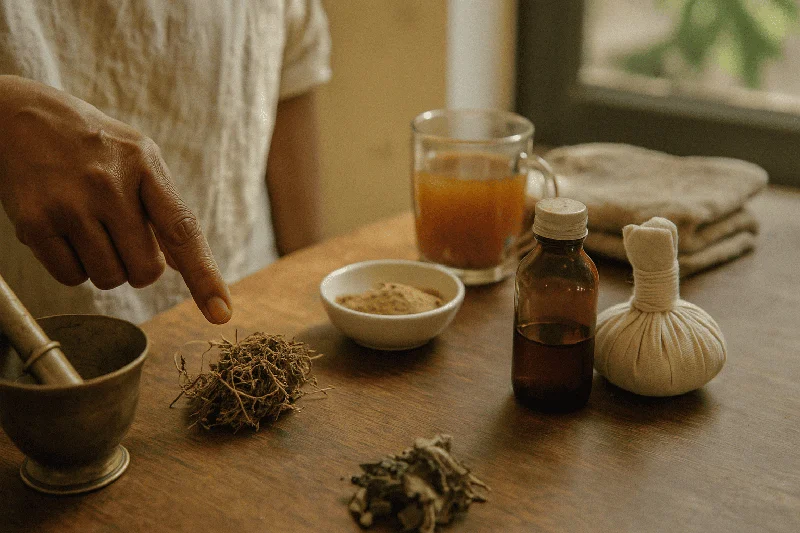Ask Ayurvedic doctor a question and get a consultation online on the problem of your concern in a free or paid mode. More than 2,000 experienced doctors work and wait for your questions on our site and help users to solve their health problems every day.
Exploring Types of Medicine in Ayurveda

Key Takeaways Shortly
- Ayurveda is a holistic system of medicine that emphasizes balance and natural healing through the use of healing herbs.
- Ayurvedic healing herbs, like turmeric and ashwagandha, are known for their unique health benefits and ability to restore balance.
- Traditional Ayurvedic medicines have been used for thousands of years, valued for their effectiveness and minimal side effects.
- Ancient Ayurvedic practices are increasingly being incorporated into modern health and wellness routines, demonstrating their continued relevance.
- Choosing the right Ayurvedic approach involves aligning it with personal health goals and lifestyle needs for optimal well-being.
Ayurveda, an ancient system of medicine from India, has been healing people for thousands of years. It combines natural remedies and holistic practices to promote balance in the body and mind. Curious about how this magic works? We'll explore the various types of medicine in Ayurveda, highlighting its use of Ayurvedic healing herbs and traditional medicines. This article will offer a glimpse into the wisdom and effectiveness of these age-old practices. With a growing interest in natural health solutions, Ayurveda's insights are more relevant than ever. Let's uncover the secrets behind its enduring appeal and effectiveness.

Herbal Potions and Their Secrets
Herbal potions, often the backbone of traditional medicines in Ayurveda, are crafted using a mix of Ayurvedic healing herbs. These potions have been used for centuries to treat various ailments. Imagine a soothing drink made from a blend of herbs like Ashwagandha and Turmeric. Each herb brings its unique property to the table, like stress relief or inflammation reduction.
A fun fact: a study found that nearly 80% of the world's population relies on herbal medicine for part of their healthcare (World Health Organization). This highlights the global trust in these ancient remedies.
The process of making these potions can be as simple as boiling herbs in water or as complex as fermenting them for weeks. Each method extracts different benefits. For example, boiling Tulsi leaves might help with colds, while a fermented potion could boost digestion. The key lies in understanding which herb works best for what condition. These potions aren't just about healing; they're about balancing the body's energies, known as doshas in Ayurveda.
Traditional Medicines: Old but Gold
When we talk about traditional medicines in Ayurveda, we're diving into a world where ancient wisdom meets everyday health. These medicines have stood the test of time for over 5,000 years, proving their worth repeatedly. Ayurveda is not just a trend; it's a practice rooted deeply in nature and balance.
One fascinating fact is that nearly 80% of India's population uses some form of traditional medicine, highlighting its continued relevance and trust among millions. This statistic underscores the importance of Ayurveda in modern society.
Let's explore some key traditional medicines in Ayurveda. Chyawanprash is a well-known herbal tonic. It's made from a blend of herbs, including the potent amla, rich in Vitamin C. People use it to boost immunity and energy levels. Another popular remedy is Triphala, a combination of three fruits. It's often used for digestive health and detoxification. These examples show how Ayurvedic formulations focus on treating the body as a whole.
Now, think about the importance of herbs. Ayurvedic healing herbs are the backbone of these medicines. Take Ashwagandha, for instance. It's known for its ability to help the body adapt to stress. Then there's Turmeric, a household name, famous for its anti-inflammatory properties. Such herbs are not just medicinal but also a part of daily life, showing how Ayurveda integrates with everyday routines.
In a world filled with synthetic drugs, traditional medicines in Ayurveda offer a natural alternative. They remind us of the power of nature and the wisdom of the past. This blend of old practices and modern understanding keeps Ayurveda relevant, offering solutions that are both gentle and effective.

Modern Uses of Ancient Wisdom
Ayurveda, with its deep roots in ancient practices, has found its way into today's world in fascinating ways. One of the most interesting aspects is how traditional medicines from Ayurveda have been integrated into modern healthcare. For instance, turmeric, a common Ayurvedic healing herb, is now widely recognized for its anti-inflammatory properties. According to a study published in the Journal of Medicinal Food, turmeric shows promise in managing arthritis pain, which highlights its relevance and effectiveness in modern medicine.
Ayurvedic principles focus on balance and harmony within the body, which resonates well with contemporary health goals. Many people today are turning to Ayurveda to address lifestyle-related health issues like stress and digestive problems. Yoga and meditation, both rooted in Ayurvedic traditions, have gained worldwide popularity for their mental and physical health benefits. This blend of ancient practices with modern needs speaks to the adaptability and timeless nature of Ayurveda.
Moreover, the rise of natural and organic product trends has paved the way for Ayurvedic products in the skincare and wellness industries. From herbal teas to skincare creams, these products often emphasize natural ingredients and holistic healing. This aligns perfectly with consumers' growing preference for more natural and holistic approaches to health and beauty.
While the scientific community continues to study and validate many Ayurvedic practices, the influence of this ancient wisdom on modern health practices is undeniable. The integration of these age-old remedies into our present-day lives shows a beautiful synergy between tradition and innovation, offering a holistic approach to health and wellness that many find appealing and effective.
Choosing the Right Ayurvedic Path
Finding your way in the world of Ayurveda can feel like a journey. The types of medicine in Ayurveda are vast and varied. From Ayurvedic healing herbs to the deep roots of traditional medicines in Ayurveda, each offers something unique. It's all about understanding what suits you best.
Ayurveda teaches us to listen to our bodies. This ancient wisdom emphasizes balance and harmony. Whether it's through diet, herbs, or lifestyle, the right path is personal. Some might find peace in herbal supplements. Others might benefit from diet changes or yoga practices.
Your commitment to exploring Ayurveda is a step toward better health. Dive into the different types of medicine in Ayurveda, and see what resonates with you. Share your journey with others. Leave a comment or tell us your experiences. You could inspire someone else to embark on this holistic path.
Engage with more content about Ayurvedic healing herbs and traditional practices. Share this article with those curious about Ayurveda. Your interest could spark a conversation about natural health. Let's explore Ayurveda together and uncover its timeless benefits.
FAQ For Types of Medicine in Ayurveda
What is Ayurveda and how does it work?
Ayurveda is an ancient system of medicine originating in India over 3,000 years ago. It focuses on achieving balance in the body through diet, herbal treatment, and yogic breathing. By using natural methods, Ayurveda aims to treat and prevent illness while promoting overall well-being.
What are some common Ayurvedic herbs and their benefits?
Some common Ayurvedic herbs include turmeric, known for its anti-inflammatory properties, and ashwagandha, which is celebrated for reducing stress and improving energy levels. These herbs are integral to Ayurvedic medicine, each offering unique health benefits.
Are Ayurvedic medicines safe to use?
Ayurvedic medicines are generally considered safe when used properly and under the guidance of a qualified practitioner. They have minimal side effects compared to conventional medicines, largely because they use natural ingredients. However, it's important to consult with a healthcare professional before starting any new treatment.
How are traditional Ayurvedic medicines relevant in today's world?
Traditional Ayurvedic medicines remain relevant today due to their effectiveness and holistic approach to health. They complement modern health practices by addressing the root cause of health issues and focusing on preventive care, making them suitable for integration into contemporary health regimes.
Can Ayurveda be combined with modern medicine?
Yes, Ayurveda can be combined with modern medicine. Many people find that integrating Ayurvedic practices into their routine enhances the effectiveness of conventional treatments. However, it's crucial to consult healthcare providers to ensure that both approaches work harmoniously without adverse interactions.
How do I choose the right Ayurvedic treatment for my needs?
To choose the right Ayurvedic treatment, consider your health goals, lifestyle needs, and consult with an Ayurvedic practitioner. They can help tailor a plan that includes appropriate herbs, diet, and lifestyle changes to suit your individual needs and promote balance.
Is Ayurveda suitable for everyone?
While Ayurveda offers benefits for many, it may not be suitable for everyone, especially those with specific health conditions or allergies to certain herbs. It's essential to seek advice from qualified professionals to determine if Ayurveda is appropriate for your situation.

